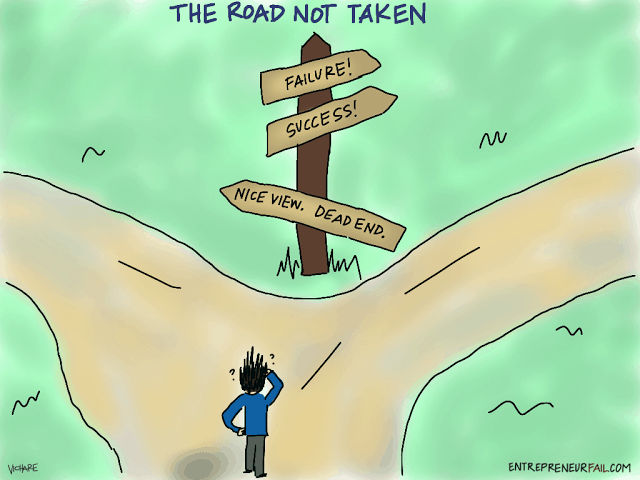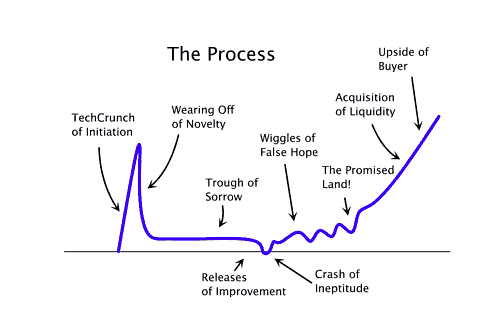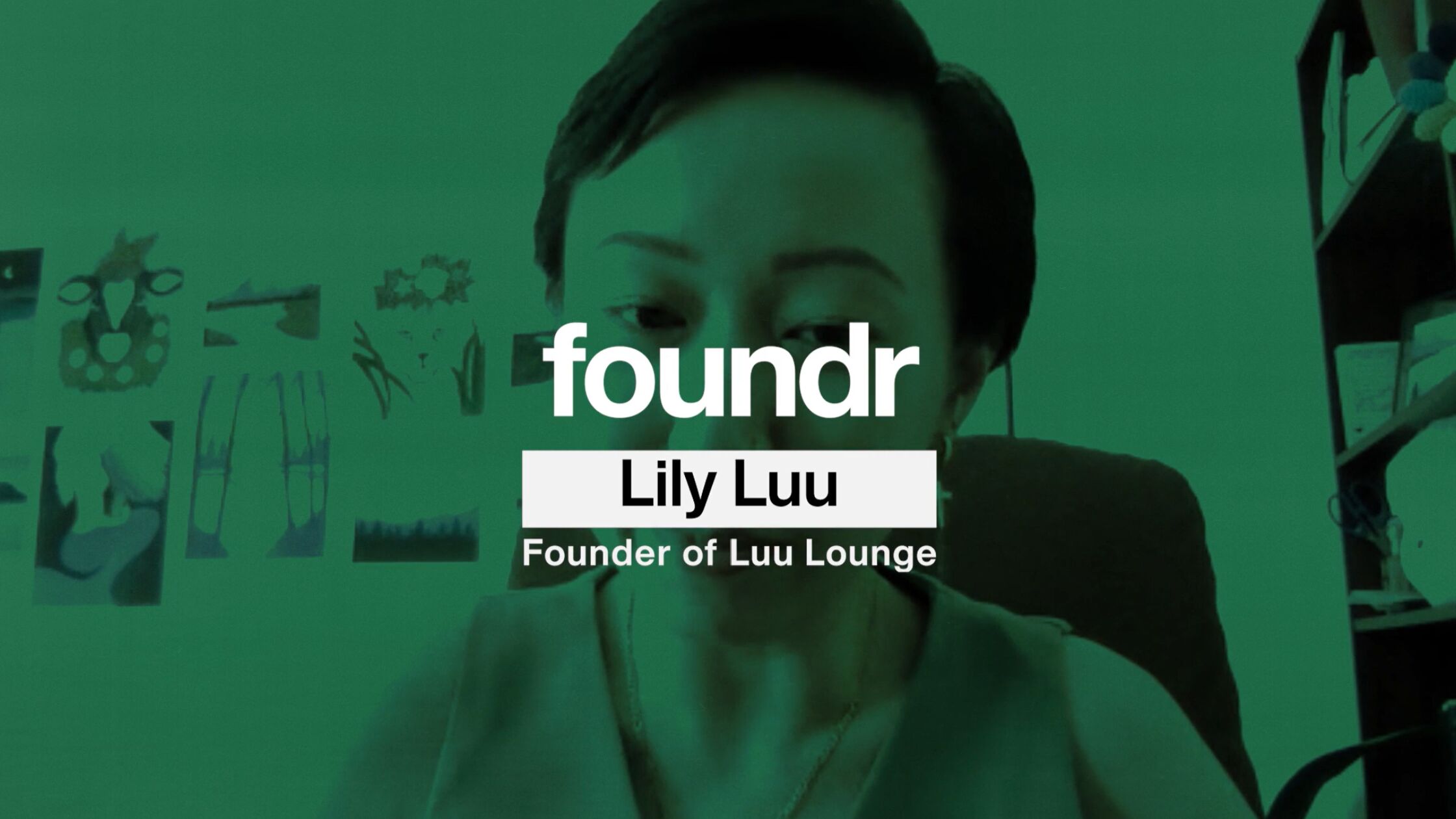Note: This week Foundr decided to do something a little different with our blog post. We decided to put our money where our mouth is and shine the spotlight on our CEO Nathan Chan. So we go back to the origin story, the trials, and the lessons learnt, to give you some insight on what it’s like when it comes to changing careers from full-time employee to full-time entrepreneur.
What is it that motivates people to leave the corporate world to start their own business?
It could be that desire to create something new, to fulfill that lifelong passion of yours. Or maybe your boss just sucks and you know you can’t go back after you’ve left a nice, hot, steaming present on their doorstep.
We’ve all worked a job we’ve considered a dead-end before. But the pattern of a steady paycheck, good friends, and the security of routine kept us in a place we know we didn’t love.
It’s not like you don’t like it, or that it’s not comfortable, you just don’t love it.
It’s like that feeling of going to the movies with your friends to see the latest Adam Sandler movie. You know you’re not going to love it but all your friends are going, and it’s a decent-enough film. So you sit through it and watch the same routine of jokes over and over again. Sure you get a chuckle here and there, but generally it feels more draining than anything else.
Now imagine feeling like that for the rest of your life.
And yes I did equate working in the corporate world to watching an endless marathon of Adam Sandler movies.
Entrepreneur fail does an excellent job of showcasing the crossroads we often find ourselves in.
You’re not the only one that feels the uncertainty of leaving a stable job to become an entrepreneur. After all being an entrepreneur carries its own set of challenges and hardships. It’s only reasonable to feel unsure.
At the time of this publishing it’s been just a little over a year since Nathan Chan left his job to work on Foundr Magazine full-time.
Here he is on his last day at Intrepid Travel.
Like the majority of people the decision didn’t come easily and the transition was hard. There were highs and there were lows, but today Foundr Magazine is one of the top 10 business magazines in the app store.
Here’s how Nathan made the move from a full-time job to full-time entrepreneur. The risks he took, the lessons he learned, and the strategies to ensure success.
Find the motivation
“I think one the biggest things you need to be is hungry. If you’re not hungry, if you’re just doing it for fun, if you’re just doing it because you want to see what happens, if you don’t want it bad enough, if you’re doing it half-assed, if you’re not really trying to give it 100%, then you’re not going to make it.
I think you have to want it so badly, you have to have so much drive and determination. And you have to be prepared to get up at 5am in the morning when you’re super tired and you’ve gone to bed at 1am. You have to be prepared to write a whole ton of emails and be rejected and have people not reply back to you.
That’s the kind of stuff you have to be prepared to do because you’re going to get a lot of that.
There’s going to be a lot of people telling you that it’s not going to work, there’s going to be a lot of people that aren’t going to get back to you, there’s going to be a lot of people who won’t try to help you, there’s going to be a lot of people who want to bring you down, there’s going to be a lot of people who think you’re an idiot.
You’re going to want it so badly you don’t care about what people think, you’re not afraid to fail. You’re super hungry.”
First of all, be honest with yourself. Why do you really want to start your own business?
Are you feeling like you’re not in a position to advance? Do you just not like your current colleagues? Do you want the freedom to be your own boss? Everyone’s motivation is different so don’t stress about having the right reason, just make sure you have one that’s right to you.
Because later on when the going gets tough and you feel like giving up, you’re going to need to remember the reason why you started.
Like Matthew Michaelwicz says, “See the end from the beginning.”
Keep in mind that you shouldn’t expect to achieve your goal right away. Our minds often only see the end outcome, not the work it takes to get there.
For Nathan, the IT tech support at Intrepid Travel, it was all about the lifestyle.
“Originally it was all about the lifestyle, being able to wake up when you want, being able to work your own hours, having the freedom to work on a laptop, to travel around the world, and creating something with your own two hands. I think I craved making a difference, making a dent, making an impact.”
As I’m sure many of you can relate to, it was the realization that he was working a 9-5 that wasn’t making him happy, it wasn’t fulfilling, and it wasn’t something he wanted to do.
“I was doing work that didn’t really fulfill me and I got sick and tired of doing work that I didn’t enjoy.”
If there wasn’t a job opportunity for him to live the lifestyle he wanted, then he’d just have to create his dream job. Simple as that.
All in the preparation
So you’ve made the decision to start your own business but how do you work on your business when you have a full-time job?
A lot of people get turned off the idea of starting their own business because they believe it’s a binary decision. You have to choose between working full-time at a job, or working full-time on your startup.
But it doesn’t have to be like that.
There are too many stories of entrepreneurs suddenly quitting their day jobs in order to pursue their startup idea. Then it all sinks because they haven’t even validated their idea yet, they’ve underestimated the amount of resources needed.
As I’ve mentioned before in a previous article it’s not that entrepreneurs don’t take risks. They just don’t take unnecessary ones.
When changing careers think about using the “Tarzan technique”, as described by Derek Sivers. Notice how Tarzan swings through the jungle, he doesn’t let go of the previous vine until the next vine is supporting his weight.
While there is a certain romantic idea of jumping off a cliff and building a plane on the way down, I prefer knowing that I have a parachute if I need it.
For Nathan, he worked on Foundr on the side for over a year before finally leaving his job at Intrepid Travel.
Every day Nathan would spend at least 30 minutes to several hours working on developing Foundr. He knew that every day had to be spent moving the needle forward, even if it wasn’t much, as long as he was moving forward.
So using Matthew Michaelwicz’s goal pyramid, he broke down the goals he needed to achieve in order to make Foundr.
“I didn’t write a business plan, but I did write down some goals. Monetary goals around how much money I needed to make, how much the business had to be turning over for me to leave my job. That was really key and critical because I actually looked at those goals every single day. And I still look at those goals and I think about them, and I talk about them, and I obsess about them every single day.”
If he was going to dedicate his full attention to developing Foundr there were three things he needed to make sure of:
-
“The business was making enough to replace my income, almost,
-
I had 6 months worth of savings,
-
and I was told by my mentors and my peers ‘it was time.’”
Finding the experience
As a startup founder your ability to learn quickly and on the job determines whether or not you succeed. But it’s easy to get overwhelmed at the start, especially if it’s your first business.
No amount of books, courses, or lectures will be able to properly prepare you for the real world. At the end of the day there is no substitute for wisdom gained through experience.
Which is why it’s almost imperative that founders find themselves some good mentors or career coach.
Shortcut the learning curve and need for experience by finding someone that already has that experience.
According to the Startup Genome Report founders that have defined mentors raise, on average, 7 times more money and have 3.5 times better user growth. Almost universally mentors significantly and positively influence a business’s performance.
A great mentor has a wealth of experience to draw from, the ability to communicate openly and honestly, and be direct yet supportive.
However finding someone to call a mentor is admittedly tricky.
When it came to reaching out to Ed Dale and Matthew Michaelwicz it was all about serving first and asking later.
Here are the 6 rules Nathan stands by when it comes to finding a mentor.
- “Having something to show, a product / service I created that showed I was serious about building a business
- Serving first and ask later
- Showing extreme amounts of enthusiasm
- Not asking that person to be my mentor
- Being persistent when asking for help
- Making myself vulnerable, and simply asking for help”
Like any business or relationship it’s all about ensuring that you’re providing value, and not simply extracting it.
Ed Dale wouldn’t be someone Nathan could go to for advice if he didn’t prove that he was serious about wanting Foundr Magazine to succeed. Nathan wouldn’t have met Matthew Michaelwicz if he hadn’t offered to feature him in the earlier issues of Foundr Magazine.
In both relationships they were friends first, it was only over time they naturally became mentors. People you could turn to for advice when you need it.
The trough of sorrow
Anyone that’s ever been an entrepreneur will know this feeling.
The one where for about two weeks, maybe even a month, into working full-time on your startup you’re feeling like the very embodiment of good vibes and productivity. You’re super motivated and you’re just filled with nothing but ideas and the motivation to tackle any challenges that life might throw your way.
We call that the startup high.
It’s a great feeling. But like any other high it’ll wear off sooner or later.
The novelty of being an entrepreneur wears off and the truth hits you. That it’s all on you, if you want to succeed you’re going to have to work harder than you ever have before.
Paul Graham calls this bit the trough of sorrow.
This bit is the make-or-break point for every startup. It’s all down to whether or not you can make it through this very long and very frustrating period.
There are the usual problems to look out for. The feeling like you’re stuck in a routine, the irrational fear of failure, the demoralization.
It sucks and everyone goes through it, but here’s one you don’t expect: the drop in productivity. Which sounds weird because now that you’re quit your job to work on your startup full-time shouldn’t you be getting more done?
“One thing I didn’t expect was finding a good work routine, I remember when I first left I didn’t know what to do because I was always so used to working on Foundr after hours. So it took me a while to adjust working on Foundr full time. I remember I made a calendar of this big list of things to do and I didn’t do any of them because I was struggling to be productive.”
For months Nathan struggled with the effects of a sudden change in environment.
However like I said earlier, when the going gets tough you need to remember the reason why you started.
Cut through all the noise that’s going on in your head and remember the difference you wanted to make.
One of the worst things any founder can do is keeping everything in their head. The human mind likes to overestimate the possibility of failure, it often warps facts and blows them out of proportion. So the best thing to do is to find a system that doesn’t let those thoughts stay in your head for too long.
One of the ways Nathan broke out of the trough of sorrow was to keep his thoughts out of his head. Turning his fears into goals that he could actually see and achieve.
“I’d write my tasks for the day on post it notes, I’d write all the things that were on my mind, so I’d brain dump it all down.”
Research has shown that creating a visual representation of your problems, whether it’s a diary, a mind-map or a blog, significantly reduces stress and anxiety. That’s because when stressed your problems seem much larger than they actually are. Actually writing about it let’s you see them for what they really are: simple challenges, challenges that be overcome. Change the way you frame problems and you’ll find out that they’re not impossible, they may be difficult, but they’re not impossible.
The trough of sorrow sucks. But the key to getting through it, is to recognize and celebrate each and every victory that comes your way and to constantly seek improvement with your product/service offering.
Celebrating $5
Here is the first sale that Foundr ever made. It was $5.
Any seasoned entrepreneur will be able to tell you there’s just something special about your first ever sale. You’ll never forget your first.
As an entrepreneur the threat of burnout, depression, or simply just quitting out of frustration is always near. Which is why you must always celebrate the small wins.
In the early days of Foundr it was all about finding the small victories whenever you could.
“It might be an interview we land, or a big launch that we do, it’s just like these little wins that keep you going especially in the early days. It was more around the interviews we landed, hearing from our community members.”
Nathan always celebrated the small victories. But like anyone else, the best victory was hearing from people whose lives he had impacted with Foundr.
“For me and my own self-confidence I just needed to hear from enough of our community members that our work was appreciated, our work was helping people, and that’s when I eventually came to the realization that we were onto something.”
There really isn’t anything quite like knowing that someone took the time out of the day to tell you how much of an impact you’ve made on them.
For many entrepreneurs it’s easy to get caught up in the logistics of the business, to only think about the daily goals you need to achieve, in order to grow certain facts and figures. But the real gold is realizing that you’re making a difference, that you’re doing what you set out to do and create a change in people’s lives.
At the time of this writing we still celebrate the small victories at Foundr. Whether it’s treating ourselves to a nice lunch after the first successful launch of our Instagram Domination webinar, or planning a day for paintball for reaching our targets last month.
We make sure to keep ourselves motivated by taking the time to appreciate all the little steps it takes to building a big goal.
Conclusion
Changing careers can be difficult. It’s a transition period that can be at times awkward, uncomfortable, and even painful.
It’s often scary when you make the choice to leave a steady paycheque, friends, and a familiar environment. To risk it all for a career where you’ll often stumble, hit roadblocks, and encounter setbacks.
But if we can prove that it’s possible then so can you!
There’s nothing more fulfilling and rewarding than being an entrepreneur. But as I hope our origin story shows you, it doesn’t happen overnight. It took a whole lot of grit and hustle to push past it all and end up where we are today.
So learn from our mistakes, and know that a roadblock isn’t the end of the road.
As always remember to leave a comment below, and to like and share if you’ve enjoyed this article!






















